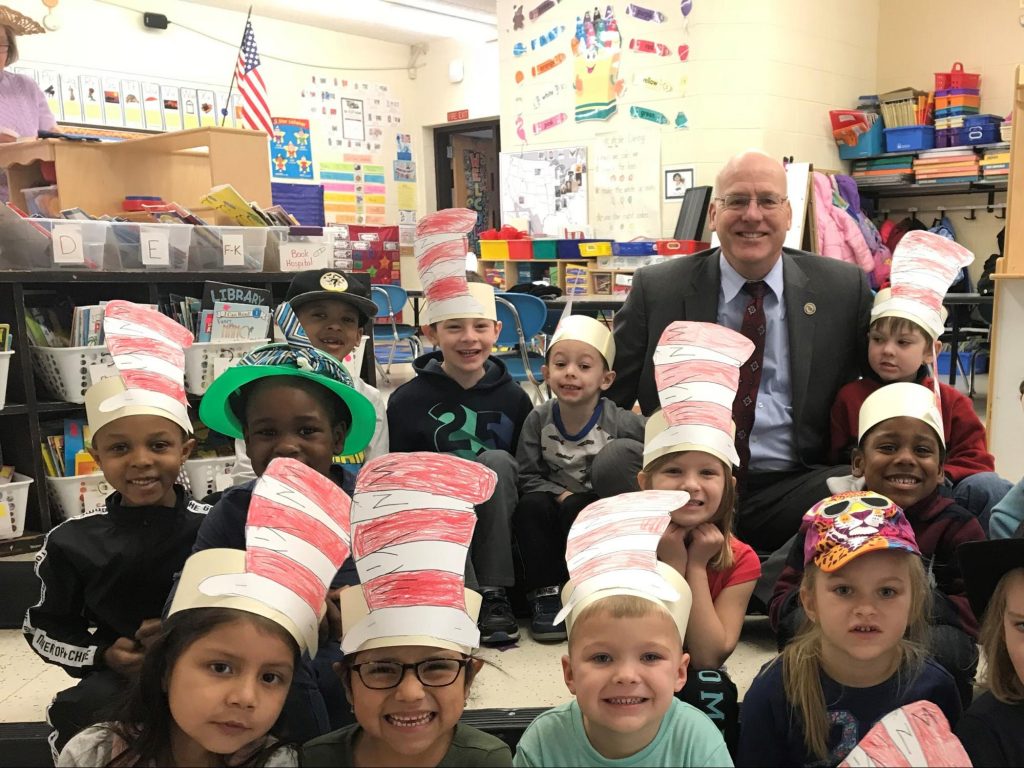
Superintendent David Healy and a group of Toms River kindergarten students. (Credit: TRRS)
Amidst a financial crisis stemming from an $18 million cut in state funding, Toms River Regional school officials have confirmed that the district will retain its full-day kindergarten program for the 2020-21 school year.
The district’s full-day kindergarten program dates back to 2013, when it was prioritized by the Board of Education. At the time, the district was among only 19 percent statewide that didn’t offer full day kindergarten classes. Prior attempts, which were contingent on Toms River taxpayers approving millions in referendum dollars, had failed. After a substantial rise in students qualifying for free and reduced lunch – a barometer of socioeconomic status – after Superstorm Sandy devastated the community, school officials were able to obtain extra funding from the federal government for the program. By that time, the percentage of students receiving assistance had risen from 20 percent to more than 29 percent.
The announcement about the future of the program comes as the first cohort of students who participated in full-day kindergarten are in the fourth grade. Though the data is early, school officials say the number of students who are retained – the modern phraseology for being “held back” to repeat a year in school – has dropped by a staggering 69 percent. Despite the district’s financial struggles brought on by Trenton, officials prioritized an effort to keep the program active.
“This initiative represents more than just a longer school day,” said Elementary Assistant Superintendent Debra McKenna. “It represents a wholesale change in curriculum, using research-based practices that focus on social interaction, positive decision making, individualized learning, and center based activities to foster independence.”
Meanwhile, the number of students receiving basic skills services has also dropped, from 22 percent to 18 percent. There is a hope – if not an expectation – that students who participate in the full-day program will be less likely to drop out of school and more likely to score well on state-mandated testing and college-readiness tests like the PSAT and SAT.
“This investment in our youngest students is transformative for a school district and honors advances at our intermediate and high schools,” according to Superintendent David Healy, who designed the district’s program. “Our initiatives continue to be recognized across the state, from literacy to computer science to makerspaces.”
Though the Department of Education does not mandate that districts offer full day kindergarten, it recommends it, and research supports its impact. “Ironically,” the district said in a statement to the press, the state directed tens of millions in funding towards pre-school expansion when 20 percent of NJ schools don’t have full-day kindergarten. Indeed, neighboring Brick Township has received millions in funding for pre-school while being forced to slash Advanced Placement classes and increase class sizes.
The district warned, however, that due to the state cuts – the product of an agreement between state Senate President Steve Sweeney (D-Gloucester) and Gov. Phil Murphy – the program may not survive long term. But for now, the program will remain in place.
“If we’re being stripped of the funding that otherwise would allow us to host our kindergarten program, and then denied any recourse to recoup that funding, what are we supposed to do?” asked Healy. “And while I fully support strong pre-schools, if it’s at the expense of kindergarten I have to ask, where are these pre-schoolers supposed to go at the culmination of pre-school?”
Parents of kindergarten-age children are urged to register early.
“Parents are strongly encouraged to register early to maximize the chances of their children being placed in their home school,” an announcement recently said. “Registration will take place in the twelve elementary schools in March 2020.”
~
Further information can be found at www.trschools.com/registration/kindergarten.


Police, Fire & Courts
Toms River Man Sentenced to Prison for Assault, Eluding, Robbery, Threats

Environment & Weather
NWS: Snow Will Begin Around 4pm Tuesday, 3-6 Inches Predicted

Environment & Weather
NWS: Snow Will Begin Around 4pm Tuesday, 3-6 Inches Predicted






